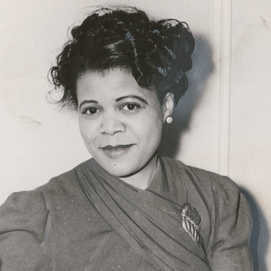Our Firm’s social committee, led by our amazing associates, is celebrating Black History Month by shining the spotlight on a different Black lawyer, judge, or other trailblazer in North Carolina who impacted the legal profession.
“Throughout history, Black people have faced great adversity in the pursuit of joining the legal profession and achieving equality in the United States. “A Spotlight on Black History” serves as a reminder that Black history is interwoven into the fabric of our profession and essential to where we are today – not only as a profession but as a state and nation.” Associate Attorney Britney Weaver
Attorney Ruth Whaley, 1901-1977

Ruth Whaley, a North Carolina native, was a trailblazer. The first Black woman to receive a North Carolina law license, Whaley’s accomplishments impacted not only North Carolina, but also New York, where Whaley was a licensed attorney and public servant for many years.
Whaley was born in Goldsboro in 1901. Whaley attended Livingstone College in Salisbury, North Carolina, a historically Black college, earning her degree in 1919.
Following her graduation from Livingstone, Whaley enrolled at Fordham Law School. She was the first Black woman to ever enroll at the law school. In 1924, Whaley graduated from Fordham at the top of her class. Whaley passed the bar exam in 1925 and became one of the first Black women to practice law in New York.
In 1933, Whaley was sworn into the North Carolina State Bar, becoming the first Black woman to become licensed to practice law in North Carolina. However, in the Jim Crow-era South, Whaley was prevented from actively practicing law.
Whaley returned to New York, where she built an unparalleled legacy. Whaley practiced civil service law, representing black local government employees—including her husband—in discharge proceedings. Whaley argued in front of the Second Circuit Court of Appeals on many occasions. In 1945, Whaley ran for New York City Council as the first Black woman to run as a Democrat. From 1951 to 1973, Whaley served as Secretary of the New York City Board of Estimate, working in tandem with the City Council. Whaley became the first president of the New York City National Association of Negro Business and Professional Women, and also served as president of the National Council for Negro Women. Whaley was also a member of the Fordham University Council. The Association of Black Women Attorneys awards an annual scholarship to law students in Whaley’s honor.
During her career, Whaley remarked on the expectations placed on Black women lawyers. In her 1949 essay titled, “Women Lawyers’ Lot Not Easy: She Must Balk Both Color and Sex Bias,” Whaley wrote:
More is required of a Negro woman who is a lawyer by her colleagues, the courts, and the community. This performance “over and beyond the call of duty” is not generally a conscious requirement on their part. It is the penalty usually exacted from a minority or from pioneers, and Negro women are a minority among lawyers. History may well record as a pioneer every Negro woman who in the year, 1949, is a lawyer.
Notwithstanding this reality, Whaley said of her chosen field, “My admiration is undimmed.”
For more information regarding Whaley and her legacy, please visit the following links:
